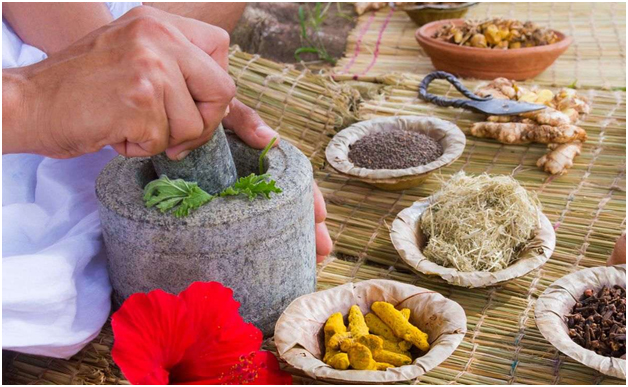The name “Ayurveda” is derived from two words in Sanskrit, “ayuh” meaning “life” or “longevity” and “veda” meaning “science” or “sacred knowledge.” Ayurveda’s definition therefore roughly translates as “the science of longevity” or “the sacred knowledge of life.”
At its root, Ayurveda is a holistic tradition and way of living that can help each of us to claim and celebrate our capacity for wellness. Ayurveda can help us:
In other words, Ayurveda is not simply about taking an herbal formula and waiting for the results. Instead, Ayurveda encourages you to be an active participant in your own journey toward healing. This involves learning about your relationship with the elements and the unique combinations they create called doshas,
Ayurveda’s background.
The practice of Ayurveda as a medicine is believed to date back to over five thousand years, during the Vedic period of ancient India. The earliest-known references to Ayurveda and its sister science, Yoga, appeared in scholarly texts from the time called the Vedas.
The Sanskrit word for health, svastha, is a state in which the mind, soul, and senses interact harmoniously to experience a feeling of Self, wellness, and even bliss. Achieving this may seem like a lofty goal, but Ayurveda provides a treasure chest of elegant and insightful tools to help us get there.
Ayurveda takes health into the realm of personal responsibility, and once we enter that realm we are no longer random victims of the multitude of diseases that afflict humanity. In addition, we become empowered to participate in our own healing process!
Healing through Ayurveda involves all five senses. Through taste, we utilize proper diet and herbs. Through sight, we utilize proper color and beauty. Through smell, we utilize aromatherapy. Through sound, we utilize music and sound energies. Finally, through the skin we take in specially prepared herbal oils and receive massage. In addition to five sense therapy, Ayurveda advocates the periodic removal of accumulated toxins and food residues through specialized purification procedures called Panchakarma.
Ayurveda is not a system of healing in which everyone does the same practices. In fact, rarely are two programs exactly alike. Ayurveda sees each person as an individual with a different internal balance of energy called one's constitution. Understanding a person’s constitution allows the Clinical Ayurvedic Specialist, a certified practitioner of the science of Ayurveda, to set up a program of care specific for that individual. This program helps them to reestablish harmony with their environment, thus creating an optimal internal environment for healing to take place.
For instance, some people thrive on hot spicy foods, while for others it gives diarrhea and indigestion. Understanding the internal energy of the body, the Clinical Ayurvedic Specialist can predict the reactions a person will have and thus can recommend a food program specific to that individual, not only with foods but also with herbs, colors, aromas, etc.
An important part of a healthy lifestyle from an Ayurveda perspective is relaxation and peace of mind. To this extent, Ayurveda utilizes meditation and yoga as healing tools. These two powerful tools have been well documented to reduce stress and aid the function of the immune system.
We do not have to be sick. Through unhealthy life practices, our bodies become weak. Through healthy practices, they can become and remain strong once again. Ayurveda is the science of reaching our full healing potential.
With the tools of Ayurveda, a person can take back control over their health and well-being. These tools lead to the formation of an ideal internal environment which supports the healing process. It does not negate the value of using allopathic medicines in acute disease but simply gives a person a deeper understanding of the process of becoming optimally healthy.
Each person takes a journey when they become ill. The path back to health can be a difficult one. Ayurveda acts like a guide shedding light upon that journey, a teacher, sharing the tools and wisdom of the process, a counselor, supporting you as you travel, a healer, awakening the healer within you.

If you want to learn to eat healthier and incorporate more vegetables into your diet, Ayurveda may be of interest to you.
Ayurveda is the traditional form and the oldest healing system in India that treats the body, mind, and spirit as one unit. Its origins date back to the Vedic era, or more than 6,000 years ago. The concept of life according to Ayurveda is not only limited to the body or its symptoms but also includes the mind and spirit.
Ayurveda holds the principle that foods are more than proteins, carbohydrates, and fat. In fact, an ancient Veda hymn openly says that “Food is Brahma” (Creator God in Hinduism) means the food is consciousness. When we nourish ourselves through food, we are not only feeding our body, but also our mind and spirit.

